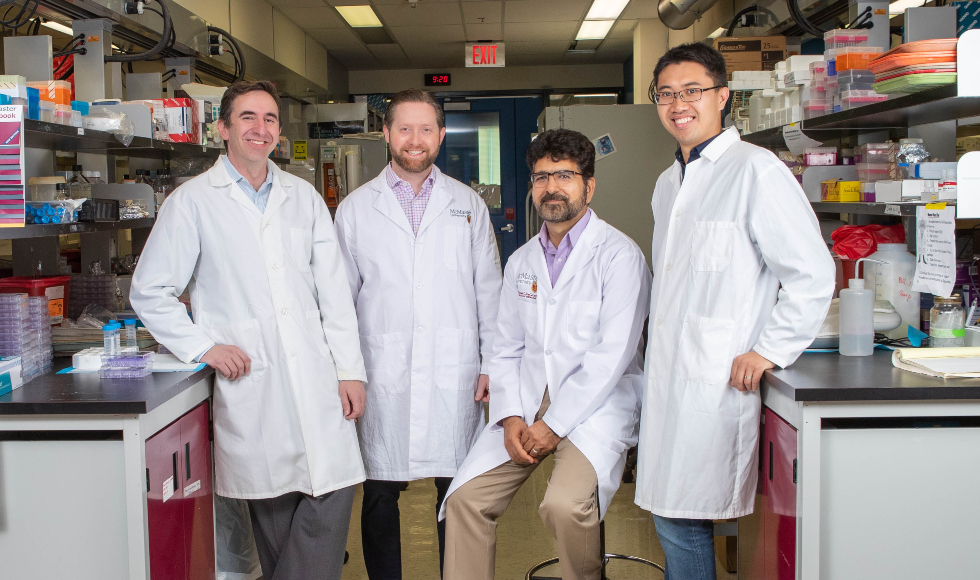Distributing vital vaccines–without refrigeration

From left: Carlos Filipe, Matthew Miller, Ali Ashkar and Vincent Leung -- the research team who, in 2019, developed a vaccine-delivery platform that does not require refrigeration
BY Wade Hemsworth
December 18, 2020
Last year when a multidisciplinary team of McMaster researchers created a viable new vaccine-delivery platform that does not rely on refrigeration, they hoped it might help get life-saving vaccines to remote locations.
That mission has taken on urgent new importance as the world races to halt the COVID-19 pandemic and new vaccines begin to roll out.
The senior researcher on the project, McMaster Chemical Engineering Department Chair Carlos Filipe, has co-founded a start-up company to move the technology into the marketplace, where it is already drawing interest from major pharmaceutical manufacturers.
“The university is a place to make discoveries,” Filipe says. “For those discoveries to reach the people who can benefit from them, we need to work with partners.”
The campus-based start-up is called Elarex, a play on ELA, the acronym for the encapsulated live attenuated virus that the McMaster researchers used in their proof-of-concept work.
The McMaster-made technology uses a dissolvable sugar-based platform – comparable to the material from which Listerine Breath Strips are made – to carry the ingredients of a vaccine. The material is designed to preserve the viability of vaccines without the necessity for continuous cold-storage, which would remove one of the most challenging barriers to getting vaccines to all parts of the world.
“Today, the whole world’s talking about cold-chain challenges with vaccine distribution,” says Elarex CEO Robert DeWitte. “This is the right technology at the right time.”
DeWitte is a McMaster Chemistry and Physics graduate who went on to earn a Harvard PhD in Chemical Physics. He brought more than 20 years of international experience in scientific and medical R&D to his previous role as Entrepreneur in Residence at the McMaster Industry Liaison Office (MILO).
The original technology had been proven using mice, so the company’s first challenge was scaling the experimental samples by about 1,000 times to reach the volume of a human dose, which it has successfully completed.
The next challenges include scaling up for mass manufacturing and conducting human trials to confirm the safety and efficacy of vaccines made with the new technology. Such work typically requires the resources of large industrial partners.
The company is working on three research projects for a major vaccine developer. Though it is contractually obliged not to disclose the name of the company or the details of the projects, Elarex is working to adapt three vaccine platforms for the company, including one to support mRNA technology, the basis for several of the emerging COVID-19 vaccines.
Filipe and DeWitte expect the Elarex platform can be used for vaccines against many infectious diseases, including COVID-19. Once the pandemic is calmed with the first-run emergency vaccines, they are working to ensure the Elarex technology can be used in subsequent versions of periodic COVID vaccines that will be used to keep the virus at bay.
Creating the start-up company is the first step in what can be a long journey to commercializing academic research – one that McMaster facilitates through its Research office and through the McMaster Innovation Park, near campus, including the McMaster Industry Liaison Office.


